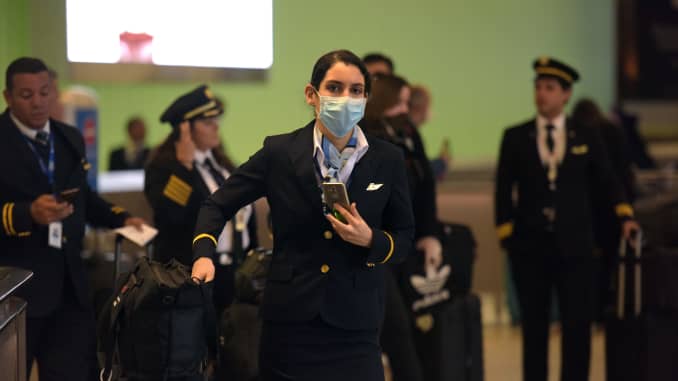‘This will lead to airline bankruptcies’ — flight attendant union furious with Treasury bailout offers
- “This will lead to airline bankruptcies,” said Sara Nelson, president of the Association of Flight Attendants union. “The Treasury Department is destabilizing the industry, not helping save it.”
- Nelson’s anger is fueled by the Treasury Department deciding to make 30% of each cash grant offer a low interest loan payable to the federal government.

Less than 24 hours after the Treasury Department formally extended cash grant offers to the six largest airlines in the U.S., the union representing 120,000 flight attendants is blasting the move with a dire warning.
“This will lead to airline bankruptcies,” said Sara Nelson, president of the Association of Flight Attendants union. “The Treasury Department is destabilizing the industry, not helping save it.”
Nelson’s anger is fueled by the Treasury Department deciding to make 30% of each cash grant offer a low interest loan payable to the federal government.
That move, which caught many airline executives by surprise, means the $25 billion approved by Congress for immediate cash grants will actually be $17.5 billion. The other $7.5 billion will now be loans airlines will be required to re-pay.
“This is not what Congress approved,” said one industry executive who asked not to be identified given the ongoing discussions between airlines and the Treasury Department. “The aid was supposed to be $25 billion in cash grants and $25 billion in loans.”
While Congress may have intended for $25 billion in immediate cash assistance to be money airlines would not have to re-pay, the CARES Act gave Treasury Secretary Steven Mnuchin the latitude to set terms and conditions for the cash grants.
“It is our objective to make sure, as I have said, that this is not a bailout, but to make sure that airlines have the liquidity to keep their workers in place,” Mnuchin told CNBC on Thursday as the Treasury Department was finalizing the grant offers.
When the offers came on Friday, they included the stipulation airlines accepting grants not lay off employees before September 30th, a requirement all carriers have already committed to meeting. Still, executives at multiple airlines told CNBC they were surprised by the loan component in the grants. They say it means Treasury will award just over half of the money they requested to cover their payrolls for the next six months.
When airlines submitted their grant applications, they included Form 41 documents which are filed regularly with the Department of Transportation detailing payroll obligations. For the industry, the total payroll obligations April 1st through September 30th is approximately $31 Billion. If Treasury awarded $25 Billion in immediate cash, it would cover 80% of airline payroll needs. The Treasury Department’s current plan to award $17.5 Billion in cash grants covers 56% of the $31 billion the airlines requested.
Nelson says reducing the immediate cash amount airlines will not have to repay amounts to Treasury taking money Congress earmarked to immediately pay airline workers and turning it into a loan airlines may opt not to take. Nelson and her team spent Friday trying to reach members of the a Treasury Department to discuss Secretary Mnuchin’s plan for awarding grants. “We have called, we have sent e-mails, but there has been no conversation with Treasury,” she said.
The leadership teams of airlines have spent much of the weekend discussing whether or not to take the grants. “It’s starting to not be worth it,” a senior airline executive told CNBC when asked if they would accept the cash grant. “I could see airlines just laying people off because it’s cheaper.”
Critics of the $50 billion airline bailout say U.S. carriers should not receive cash grants from the federal government and should instead restructure in bankruptcy or borrow billions more in order to have the liquidity needed to withstand the the rapid drop in business.
